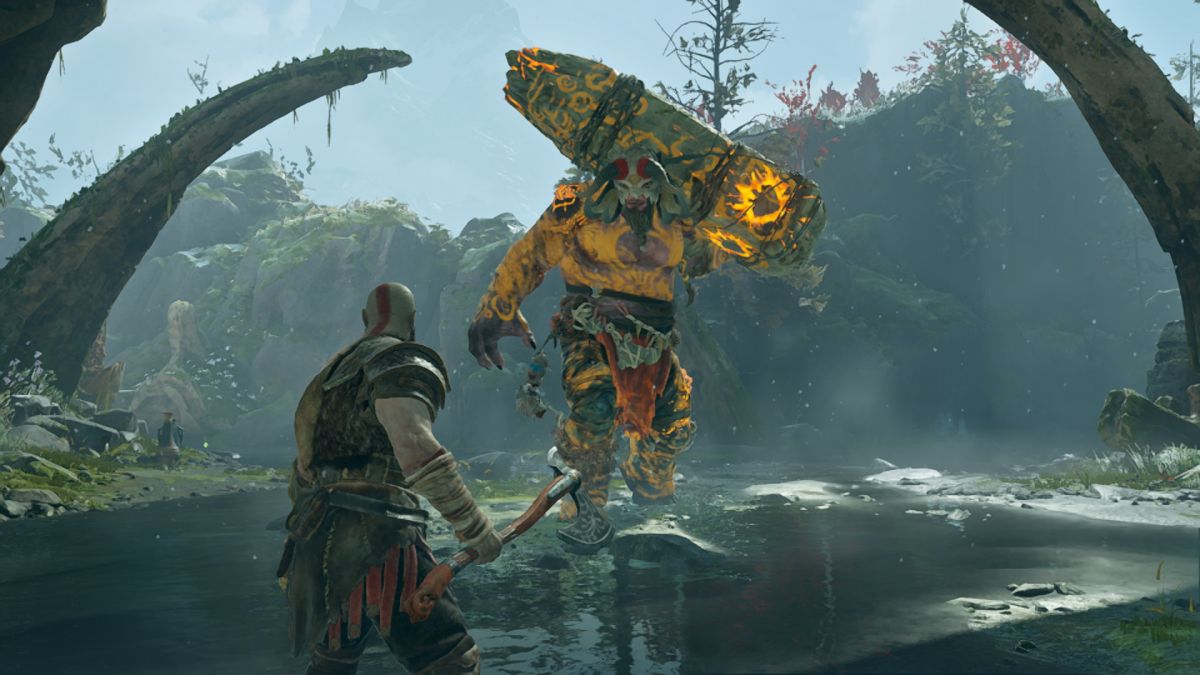[ad_1]
God of War has finally landed on PC and spoilers: it’s a decent game that has enjoyed a solid port over to our platform of choice. It looks good, plays well, and doesn’t appear to have nasty hangovers from its Playstation origins. If you want to tweak your performance to hit the perfect balance between framerates and looks, then check out our God of War best settings guide.
Here the plan is to see how God of War runs on integrated graphics, specifically AMD’s Ryzen 7 5700G. This is AMD’s latest APU, and while a bit pricey at $359, it is currently the best option for anyone looking to play games without needing to grab a graphics card—something that is all too real in these silicon starved times. Apart from being a decent 8-core, 16-thread CPU in its own right, you also get 512 GCN cores running at 2GHz for your money, which can be decent for gaming too.
There’s one thing you will need to do before jumping in God of War on your 5700G machine though, and that’s pop into your BIOS first to sort out the VRAM settings. Some games will grab as much memory as they need and just work with AMD’s Unified Memory Access, but this isn’t the case with God of War, which sees just 512MB of VRAM by default. The game still runs, so credit to Sony Santa Monica, but it looks awful, and not quite in that so-awful-it-looks-good way either.

To fix this you have to jump into your BIOS and explicitly set the size of the VRAM. 4GB should be enough for most games, but make sure you’re not stealing too much system RAM or you’ll run into other problems. In a 16GB system, 4GB is fine, but you probably need to stop at 2GB if you’ve only got 8GB of RAM in total. Which screen you change this on depends on your motherboard, so check out the website for more information. On the ASRock B550M-HDV the screen is hidden in the Advanced > AMD CBS > NBIO > GFX Configuration screen.
Now that’s done, it’s time to see what the 5700G can do with God of War. At the Original settings and at 1080p you’re looking at a beautiful but sluggish 19fps, which isn’t really playable, or an enjoyable experience, particularly in combat. Dropping down to the Low graphical settings improves performance a touch, up to 23fps, but it’s still not exactly smooth.
Compromises need to be made.
God of War support two options on the 5700G that can help here. The first is controlled by the Render Scale slider at the bottom of the Display settings screen. Setting this at its lowest option of 50% renders the game at 960 x 540 and then crudely upscales it to the screen’s native resolution of 1920 x 1080. The results are blocky, but, you will enjoy almost double the frame rate at 43fps.







A better option though is to use FidelityFX Super Resolution, which again renders to a lower target resolution but then uses smart upscaling tech to produce a better overall image. It can be a bit blurry, depending on the setting you go for, but you will see similar frame rates as rendering to that resolution anyway. For instance, selecting the Performance option renders to the same 960 x 540 as the lowest Render Scale setting, but it looks much better and manages to hit roughly the same frame rate at 42fps while working its magic.
You might be tempted to go back to the Original graphics settings with FSR set to Performance, but dropping back down to 30fps is probably a bit much. A better option is to go with FSR set to Balanced, as this drops the frame rate down to 38fps, but it does look better, thanks to the Render Resolution being higher at 1130 x 636. In fact, you can try Quality and High Quality too, although as expected the performance keeps dropping the further you go.

For a playable experience, you’re best off sticking with the Low graphics settings and either FSR Performance or FSR Balanced. That way you’ll be able to enjoy the combat of God of War while also enjoying the views.
[ad_2]
www.pcgamer.com
